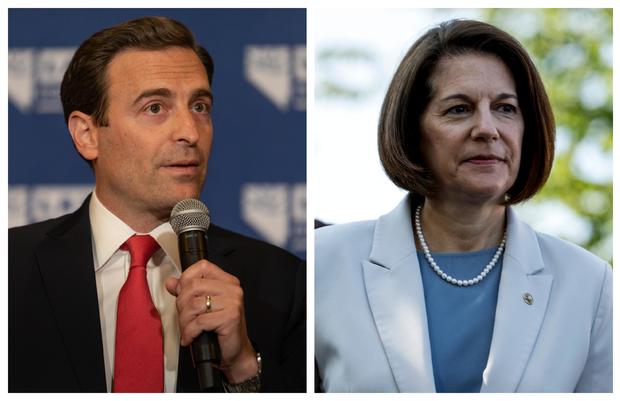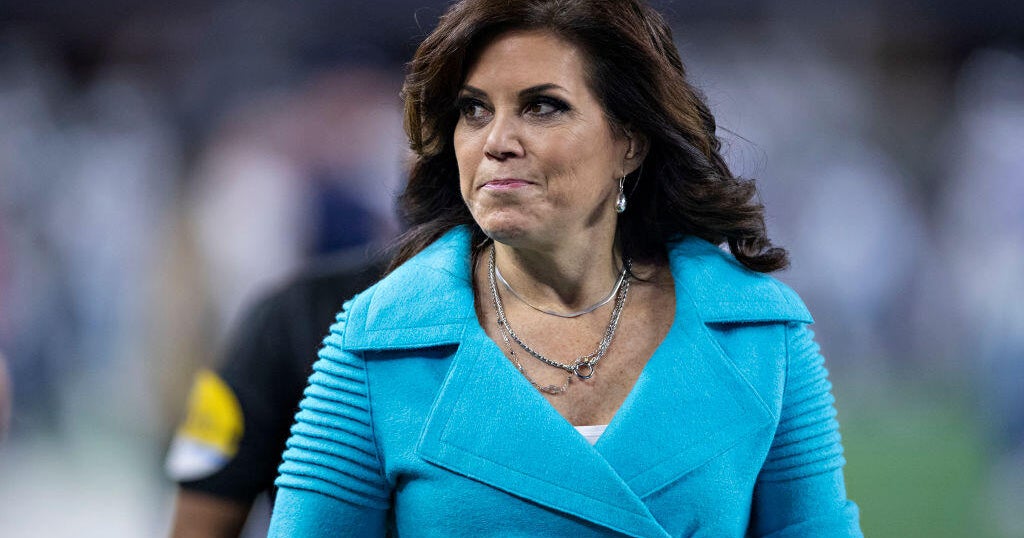Democrats and Republicans are courting Latinos on the economy in Nevada's tight Senate race
Latino voters will make up 20% of the electorate this fall in Nevada, where Democrats and Republicans expect the growing constituency's voice will sway a competitive race that could determine which party controls the U.S. Senate.
Polls show incumbent Democratic Sen. Catherine Cortez Masto, the first Latina elected to the Senate, slightly behind Republican Adam Laxalt. With early voting starting next month and campaigns hitting the final stretch, both sides are courting Latino voters with a closing message centered around the economy.
Republicans say the state's high inflation rate and rising economic anxiety gives the GOP its best chance to make inroads with working-class Latino voters and flip a crucial Senate seat.
"The Latino vote is going to help us get the victory in November," said Jesus Marquez, a special advisor to the Laxalt campaign. "If we get 35%, that would mean a victory across the board but I estimate that we're going to get 40% of the Latino vote."
Republicans also point to gains former President Donald Trump made with Latinos in Nevada in 2020 as reason for optimism.
Trump won 35% of the Latino vote in Nevada two years ago, a seven point increase from 2016. According to CBS News exit polls, Trump also made significant gains among Latino men nationally, going from 30% in 2016 to 43% in 2020.
Nevada's voting population split into thirds with registered independents coming in second behind registered Democrats. While President Joe Biden won the Latino vote in Nevada 65%-35% in 2020, he barely won the state, coming up on top by just 33,600 votes.
That narrow victory in the state – despite the significant margin with Latino voters – is why Democrats and Republicans are racing to turn out Latino voters. Their vote will help decide the winner of this Senate seat and potentially decide which party takes control of the U.S. Senate. With the Senate currently divided 50-50 between Republicans and Democrats, every race is essential to both parties.
Nationally, more than half of Latino voters say they plan to support Democrats and highlight the economy as the main issue driving their vote, according to a recent New York Times/Siena College poll. But Latinos are nearly split when it comes to which party they agree with on economic policy: 43% say they prefer Democrats' solutions to the economy while 41% say they prefer Republicans.
"The economy has just been a powerful issue for Republicans in the state," a GOP strategist familiar with the Laxalt campaign told CBS News. The strategist also said that Laxalt's campaign will demonstrate through its closing message that "Cortez Masto is a part of the problem that created this economy."
The COVID-19 pandemic severely impacted Nevada's economy, which is heavily reliant on the hospitality and tourism industries. Shutdowns at the height of the pandemic led to nearly 30%unemployment rate, twice the national average.
Latinos, who make up a large portion of the workforce that was impacted during the pandemic, also contracted COVID in greater numbers relative to their share of the population in Nevada.
Nevada's unemployment rate has come down to 4.4%, but the state's inflation rate of 15.4% is among the highest in the country. Nevada also has the third-highest average of gas prices at $5.21 per gallon, according to AAA.
Republicans in Nevada are hoping this will lead to Latino voters expressing their frustration by voting out the party in charge.
But Democrats argue that voters' concerns around the economy is an opportunity for them to highlight President Biden's legislative victories like the passage of the Build Back Better Act, the Infrastructure Investment and Jobs Act, and the Inflation Reduction Act.
"Everything we are talking about relates to the economy," said Josh Marcus-Blank, communications director for Cortez Masto's campaign. "We are going to continue to talk about ways that the senator has supported the Latino community, the small businesses that she saved, and the good union jobs coming."
The Cortez Masto campaign has also been running ads promoting the Inflation Reduction Act, which allows Medicare to negotiate lower drug prices for seniors. Democratic advocates say their party can't shy away from bragging about their accomplishments and need to highlight those wins when engaging with the Latino community.
"Latinos are in a constant persuasion window, they're actually some of the most persuadable voters we have in the electorate," said Tory Gavito, co-founder and president of Way to Win, a national Democratic advocacy group that's investing $2.3 million to bring out voters of color in Nevada. "When you tell them what Democrats are doing to support them in this economy, they will vote Democrat," she added.
That is the playbook that Make the Road Nevada, a left-leaning organization focused on turning out 76,000 Latino voters in the East Las Vegas area, is attempting to execute on the ground.
"When my community needed assistance, the Republican Party was nowhere to be found," said Leo Murrieta, director of Make the Road Nevada. "They didn't open food banks, they didn't open vaccination clinics, they didn't do any of that. It was Democrats who came together and made that sh** happen so that our families could literally survive."
It's the same message that Culinary Union is pushing as it deploys 270 full-time canvassers on behalf of Democrats in Las Vegas and Reno to knock on over 1.1 million doors, nearly doubling their effort from 2020.
Ted Pappageorge, the union's secretary-treasurer, said they are reminding voters that resources from Democrats allowed the group to convert one of its training facilities to a food bank that supported an average of 1,800 members per day for over a year.
While Republicans feel confident they can attack Cortez Masto on economic issues, her campaign also sees an opportunity to go on the offensive by talking about abortion rights and highlighting Laxalt's involvement with Trump's campaign (Laxalt served as the Trump's 2020 Nevada co-chair) and an op-ed Laxalt wrote claiming thousands of improper ballots were cast in Nevada.
Marcus-Blank said Cortez Masto's campaign will portray Laxalt as "the face of the Big Lie" in Nevada. Cortez Masto has also focused on abortion rights and made the issue a central theme of her campaign after the Supereme Court's decision on Roe v. Wade.
More than 70% of eligible Latino voters support a woman's right to choose, according to a recent poll conducted by UnidosUS, one of the largest Latino advocacy organizations in the country. In Nevada, abortion is legal up to 24 weeks after pregnancy and Republicans acknowledge the electorate in the state is pro-choice.
But the Cortez Masto campaign sees abortion as a way to mobilize Latino voters and attack Laxalt.
"It is also about reminding folks of the threat that Adam Laxalt poses. He would be an automatic vote for a federal abortion ban," Marcus-Blank said. The GOP strategist familiar with Laxalt's campaign said abortion protections are set into law in the state and "voters know that's not going to change," adding, that Laxalt opposes a federal abortion ban.
South Carolina Republican Sen. Lindsey Graham recently proposed a bill that would ban abortion federally after 15 weeks. In response to whether Laxalt would support the bill, a spokesperson for Laxalt said the proposal "has no chance to pass Congress," adding, "the law in Nevada was settled by voters decades ago and isn't going to change."
As the campaign heads into the final weeks, Cortez Masto and Laxalt are both running ads in Spanish. Earlier this month, Laxalt launched an ad in Spanish that highlights the economy. Cortez Masto is on air in Spanish discussing union jobs, healthcare, and abortion. The Cortez Masto campaign also rolled out endorsements from more than 200 Latino community leaders in conjunction with Hispanic Heritage Month.
Outside groups like the Somos PAC, a left-leaning Latino voter mobilization group, are also spending money airing Spanish ads. Democrats have reserved nearly $90 million in ad space in the final few weeks of the election while Republicans have put aside more than $70 million.






